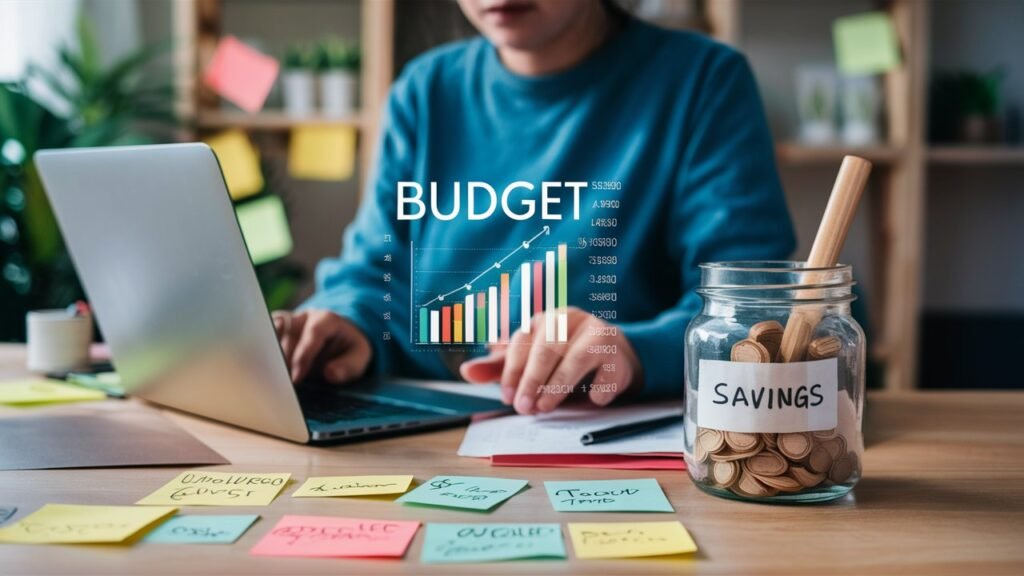Introduction to Financial Stability and Mindfulness
In today’s cutting edge phrase of mindfulness, several trends show how being financially fit could be attained. But unlike other practices that only sound good in theory, alongside a plethora of engaging incentives this one actually seems promising. For once, being money focused would be regarded as positive. The moment we put together the principles of mindfulness together with our money routine, we are certainly able to form a fusion that simultaneously encourages financial security as well as a soothing mind.

Understanding Financial Stability
Broadly speaking to feel fulfilled as an individual, a strong financial foundation needs to be established This includes.
• Budget: This is all about crushing excessively high spending in comparison to income.
• Saving: To be prepared to face a rainy day with emergency funds is also a part of this stability.
• Investing: Taking sound advice on evolving one’s financial environment is also a form of being mindful.
• Debt Management: This translation is also made possible due to the application of debt to access new funds at different spending periods.
It is alarming the extent to which emotions dictate our relationship with money, the practical know-how alone is not sufficient. Money and mindfulness together enhance this process greatly, ensuring that you stay on track of your financial goals, rather than feeling swamped.

How Mindfulness Affects Our Financial Decisions
In a nutshell Mindfulness means full focus and attention. In the context of making financial decisions, it can transform the way you approach money. Key benefits include:
• Enhanced Awareness: Self observation helps spot unnecessary expenditure habits. For instance, self observation might help you realize that your coffee runs are costing more than anticipated on a daily basis.
• Impulse Buying is Lowered: Patience is another quality that is strengthened through mindfulness, and this will help prevent you from buying a lot of things without thinking about them. Instead of succumbing to the desire to grab that shiny toy, you will reflect on whether it is essential or not.
• Conceptualized Values: Knowing your most crucial needs enables you control your spendings knowing where you need the money for. For example, this may imply making saving for a holiday more important than buying the latest mobile in the market.
An investigation discovered some people mire practice mindfulness generally make better financial choices which enhances their financial health. In addition, the American Psychological Association indicates, mindfulness may also alleviate stress and anxiety which are impediments to proper management of one’s finances.

Developing Financial Mindfulness
To develop financial mindfulness, consider implementing these practices into your daily routine:
- Ditching Goals: Explain what financial freedom stands for you. knowing your goals can help plan your decisions. for instance, would you wish to visit more places and buy a property?
- Start Being Grateful: Instead of stressing the absence of certain things, make it a practice to appreciate what is already there which is in surplus. This renewed thinking cuts down the desire to purchase some things above a reasonable level. For instance create a weekly appreciation inventory.
- Analyze The Spending Patterns: Make a record of your purchases and evaluate them from time to time. Look at the justification and target for each spending. Keeping a journal on your expenses such as shopping might reveal some patterns or triggers for impulse purchase.
The same repeated action of a financial mindfulness in itself is not easy and takes time but most effects I believe will not be immediate because practice will change your outlook on finances.
Practical Tips for Improving Financial Health Achieving financial wellness is not a walk in the park as much has to be done besides being mindful. Below are practical recommendations:

Practical Tips for Achieving Financial Wellness
Achieving financial wellness requires practical steps that can work hand-in-hand with mindfulness. Here are some tips:
- Create a Budget: Consider applications and other tools that allow for accounting of revenues and expenses. But budgets are best if they are subsequently revised and modified. Having a monthly check can be quite useful. .
- Establish an Emergency Fund: You should have funds for up to three to six months of operational expenses just in case life throws you off with unforeseen events. This can help you in reassurance during your desperate times.
- Self Education: Books and resources on personal finance can be helpful be informed, so you are able to make better choices. Sites like investopedia provide good information.
- Cut Off Marketing: Don’t watch ads, don’t make marketing a part of your life. So, clean your social accounts and keep only what you need. This helps to remain concerned with your needs rather than with what is marketed to you.
These actions when combined with being mindful can be truly useful for improving your financial wellness.

Mindfulness Practices to Enhance Financial Awareness
Mindfully Increasing Financial Awareness There are certain mindfulness practices that can also be incorporated to help you remain active in the course regarding your finances:
• Meditation: Spend just 5 to 10 minutes a day in breathing exercises, concentrating on your breath. This can make you think straight and instead of making random purchases make more reasonable ones. It is likely that a focus on breathing, through meditation, will help with worrying about money.
• Mindful Journaling: Talk about your spending events and associated feelings. This will enable you to pinpoint problems and starting points. The practice of analyzing one’s spending decisions in this manner may provide a person with a greater understanding of why they often overspend.
• Mindful Shopping: There are several questions one needs to answer within themselves such as whether a given product is a need or a want, and how it impacts one’s finances before making a purchase. Staying on impulse resolves the problem of overspending at times or sometimes in life, it’s better to stay on impulse.
Mindfulness isn’t just about slowing down; it’s about making conscious choices that lead to a better financial future.

Conclusion: Embrace Financial Stability through Mindfulness
Incorporating mindfulness into your financial practices can set the stage for long-term financial stability. By understanding your values developing awareness and adopting mindful habits you can enhance both your financial wellness and overall quality of life. Take the time to reflect on your spending habits set intentions and embrace practices that promote mindfulness. Start today, and you may find that a mindful approach to your finances leads you to a more stable and fulfilling financial future.
Engage with your financial journey actively. What steps will you take to incorporate mindfulness into your financial life today? Share your thoughts and experiences in the comments below!

FAQs
1. What is financial stability?
Financial stability refers to having a solid foundation in your financial life, including budgeting, saving, investing, and managing debt. It ensures you can meet your financial needs without stress or uncertainty.
2. How does mindfulness help with financial wellness?
Mindfulness helps you focus on the present moment, reducing impulsive spending, improving financial awareness, and aligning your spending habits with your long-term goals.
3. What are some mindful practices for managing finances?
Mindful practices include journaling your expenses, meditating to reduce financial stress, and pausing to reflect on the necessity of purchases before making them.
4. How can I start practicing financial mindfulness?
You can start by setting clear financial intentions, practicing gratitude for what you already have, and regularly reviewing your spending to ensure it aligns with your values and goals.
5. Why is an emergency fund important?
An emergency fund acts as a safety net, covering unexpected expenses like medical bills or car repairs, ensuring you don’t have to rely on credit or loans during tough times.
6. Can mindfulness improve long-term wealth?
Yes, mindfulness fosters better financial decisions, helping you avoid unnecessary expenses and focus on investments that align with your financial goals, ultimately building long-term wealth.
7. How does meditation help with financial stability?
Meditation reduces stress and enhances focus, which can help you approach financial decisions with a clearer and calmer mindset.
8. What tools can help with budgeting?
There are many tools available, such as budgeting apps like Mint, YNAB (You Need a Budget), or even simple spreadsheets to track income and expenses effectively.
9. How can I avoid impulsive spending?
To avoid impulsive spending, practice mindful shopping by pausing to assess if a purchase aligns with your needs and goals. Reducing exposure to marketing and creating a thoughtful budget can also help.
10. What is the connection between mindfulness and financial habits?
Mindfulness encourages awareness, intentionality, and discipline in financial habits, helping you make informed choices that contribute to financial stability and wellness.
RELATED ARTICLES:
1. Mindful Spending Techniques to Save More and Stress Less
2. Creating a Monthly Budget: A Step-by-Step Guide for Mindful Financial Planning

